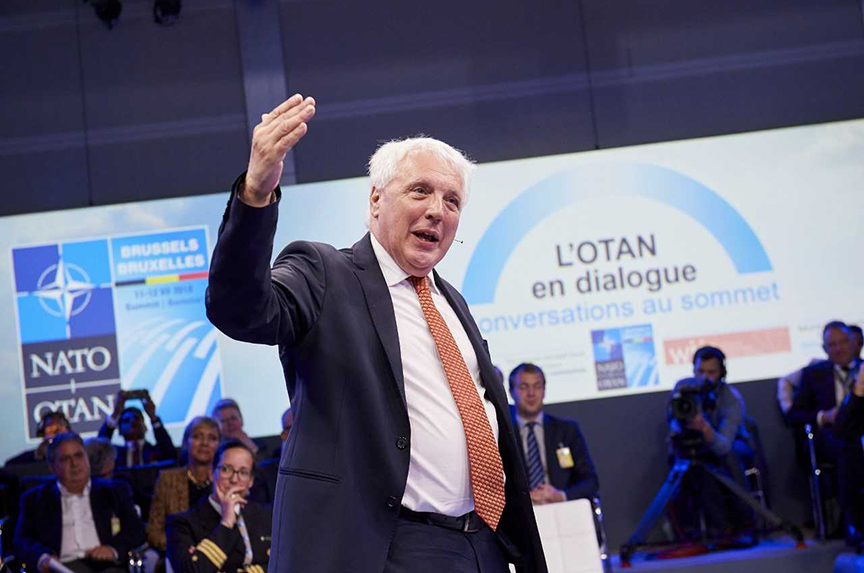Jamie Shea, one of the most recognizable faces ever associated with NATO, is retiring in September after thirty-eight years, likely the Alliance’s longest-serving official. An irrepressible defender of the twenty-nine-member Alliance, Shea nonetheless reveals that he believes NATO must do more to pair its military transformation with increased assets on the battlefield of ideas and information. “Being optimistic doesn’t mean being complacent,” he underscored, adding that NATO needs both perseverance in its core tasks and new initiatives.
Shea wishes he could stay on and continue to help guide that effort himself, but he turns sixty-five in early September, hitting NATO’s mandatory retirement age.
As he departs from his final position, deputy assistant secretary general for emerging security challenges, Shea said effective public outreach is in fact one of those challenges in NATO’s future. He leaves behind some pearls of wisdom to guide the organization’s next top communicators.
Shea noted the Alliance has dramatically improved its record since the day he arrived at its headquarters back in 1980. Then “everything in NATO was a secret,” he chuckled, “and ‘security’ meant having a public that knew nothing about what was going on.”
“We were sort of besieged, if you like, by the Cold War and by a sense ourselves that we were unpopular,” Shea explained, saying NATO basically looked at itself as if it were “undertakers.”
“We were necessary, but we didn’t expect anybody particularly to love us,” he said. But he set about changing that perception from the inside out. “If you think that you have to hide from the public… obviously there’s something almost wrong about your mandate,” he said. Shea believed protecting the populations of allied nations was a “good story” and should be told.
But he said a real turning point in NATO’s understanding of the importance of communication came when the Alliance got involved in the wars in the former Yugoslavia, carrying out its first ever combat action in 1994, an air battle over Banja Luka in Bosnia-Herzegovina. “NATO suddenly woke up with a little bit of surprise to the fact that conflicts generate more opposition than support,” Shea recalled. “Then suddenly there was this yawning realization that the media campaign was not an optional add-on, it was 50 percent of the real campaign; that it was not bullets, it may have been airwaves, but you could lose the war through a bad media campaign.”
Gradually, he said, NATO reformed its media engagement style, working harder to provide and confirm information more quickly both with civilian and military sources, fighting what he said was the “fake news” already present then. The Alliance started to comprehend the utility of having a “surge capability” in media operations as well as military operations so that “you can ramp up during a crisis when the media attention suddenly goes from zero to one hundred kilometers an hour in the space of just a day.”
WATCH: Special screening of “NATO HQ: Behind the Lines,” a documentary on Jamie Shea’s career. The documentary was screened at NATO Engages, a two-day summit co-hosted by the Atlantic Council in Brussels in July.
More than two decades after those institutional epiphanies, Shea is still brimming with ideas about how to communicate better, abandoning the traditional stiff coverage of military operations, which he calls the “old top-down lecture: I speak/you listen,” in favor of “stories… narratives… charismatic figures who are entertaining, who get their attention, who have interesting angles, who they become familiar with.” It’s not NATO’s usual fare, but Shea insists “facts and figures… only get you so far” and that the “human factor is key.”
He recommends NATO search its halls for people beyond the secretary general and the official spokesperson who can communicate in a compelling way and empower them to do so. Shea also thinks NATO should form a more closely-knit group of “alumni,” people who’ve been associated with the Alliance in one way or another previously, who are then amplifiers of “good news” when they leave the organization.
With the hybrid threats he’s focused on most recently adding to the traditional challenges with Russia and mounting concerns in the southern periphery, Shea expects the near-term future to be the Alliance’s “most challenging period.” At the same time, he said it’s “also the most exciting in a sort of perverse way because it means there’s never before been more meat to get your claws into as a NATO official.”
His normally cheerful manner tinged with a bit of regret, Shea said “we really need good ideas; we need great leadership. We need to be innovative and so I’d love to stay and be part of all of that, you know?”
Teri Schultz is a freelance journalist based in Brussels. Follow her on Twitter @terischultz.
Image: Jamie Shea, NATO’s outgoing deputy assistant secretary general for emerging security challenges, received a standing ovation from the audience at NATO Engages in Brussels on July 11.
